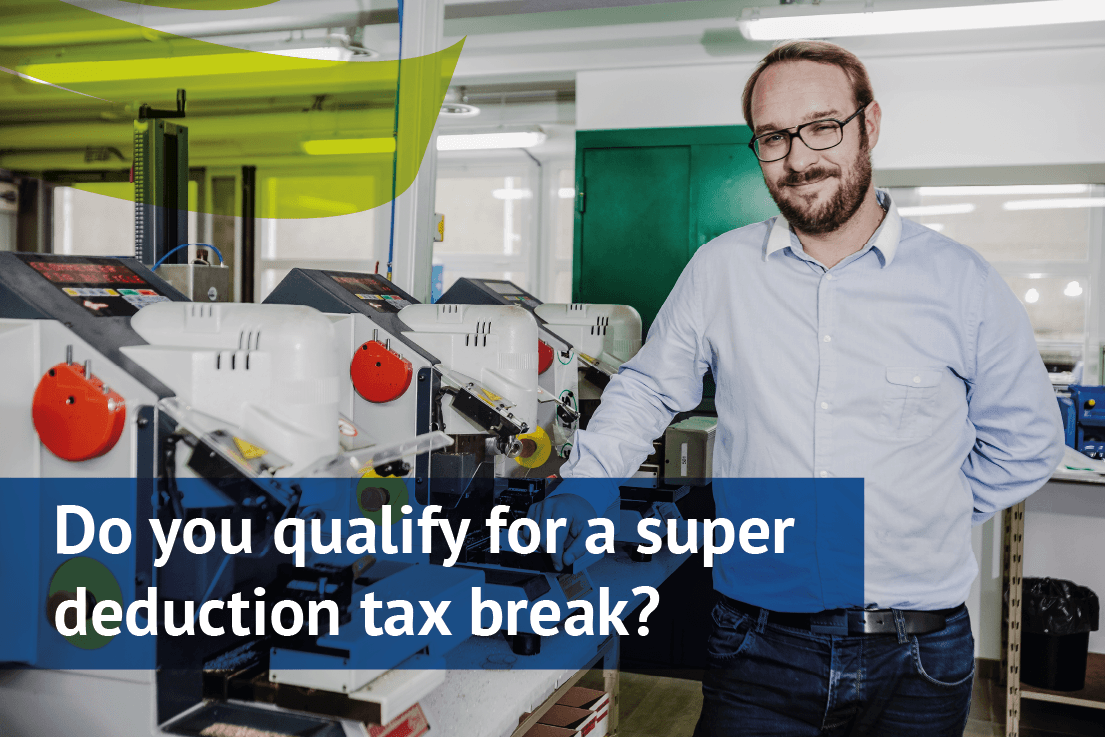Do you qualify for a super deduction tax break?
14th May 2021
The super deduction tax break was a flagship policy in the Government’s 2021/22 Budget. Designed to encourage businesses to invest in new plant machinery and equipment in a bid to support the UK economy’s post-Covid recovery, the super deduction promises tax savings of 25p in every £1 invested.
Find out how the super deduction works, who qualifies and potential pitfalls you need to be aware of.
What is the super deduction tax break?
Until 31 March 2023, companies investing in qualifying plant and machinery are entitled to 130% capital allowance on those investments.
In addition, there is also a 50% first year allowance (FYA) for special rate assets until the same date.
Capital allowances allow tax payers to write off the cost of certain types of capital assets (a capital asset is a piece of property you own for investment or personal purposes, typically things like investment properties, valuable collectibles and stocks and bonds).
Example:
A landscape gardening firm decides to spend £1m on new equipment. Under the super deduction, the business is entitled to deduct 130% of the cost of the equipment (£1.3m) from their taxable profits resulting in a saving of £247,000 (assuming corporation tax is at the current level of 19%).
Do you qualify for the super deduction tax break?
Any business which pays corporation tax can take advantage of the super deduction tax break.
The term “plant and machinery” is a bit misleading, because it covers more than just factory equipment.
In fact, most tangible capital assets used for business purposes fall under the “plant and machinery” category for the purposes of claiming capital allowances. HMRC gives a few examples but this list is not exhaustive so it’s worth double checking if an asset qualifies if you’re not sure:
- Computer equipment
- Company vehicles such as tractors, lorries and vans
- Ladders, drills and cranes
- Office chairs and desks
- Refrigeration units
- Electrical vehicle charging points
- Solar panels
However, there are exceptions. Any equipment intended to be rented out is excluded, as is anything installed in a building a landlord rents out (e.g. air conditioning units).
What’s the catch?
The super deduction only applies to new purchases, so you won’t be able to claim it on new equipment ordered prior to 1 April 2021, even if it doesn’t arrive until after this date, and used equipment is excluded too.
You could also get caught out if you sell the equipment later. You’ll effectively be required to pay the super deduction back. Remember, corporation tax is increasing to 25% on 1 April 2023 and if you dispose of the asset after this date you’ll be required to pay the relief back at the higher rate.
It’s also important to remember that although the super deduction might seem like a good deal now, the increase in corporation tax could offset it later, especially for larger companies. However, smaller businesses with profits of £50k and under will remain at the 19% level and the increase will be tapered for businesses with profits up to £250k.
Each company has a different tax structure and attributes, so it’s a good idea to check with a qualified expert and run the numbers on a case-by-case basis to check how effective the super deduction is for your business.
Talk to the experts
If you have questions about whether the super deduction tax break is tax effective for your business, get in touch with our experienced team who can help you run the numbers and offer personalised advice and support.





